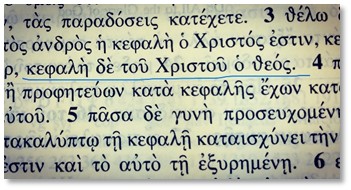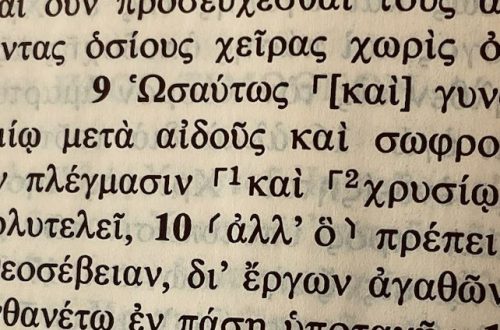Paul’s teaching about head coverings in 1 Corinthians 11:2-16 stands out as some of the most difficult material in all of Paul’s writings. This is not only because there is disagreement over what the head covering means, but also because commentators debate what the covering even is. Even though there are some obscure points in this passage, I would argue that the main point of the passage is clear enough. That main point is Paul’s teaching about headship. Verse 3 reads as follows:
1 Corinthians 11:3 “But I want you to understand that the head of every man is Christ, the head of a wife is her husband, and the head of Christ is God.”
In verse 3, Paul unfolds a series of relationships that are defined by this notion of headship, but what Paul means by “head” is precisely what commentators have vigorously disputed.
Egalitarians argue that “head” does not mean authority. On the contrary, they argue that it means source. On this view, Paul simply means to say that Christ is the source of man (in that he created man), man is the source of woman (in that Eve was taken from Adam’s side), and that God is the source of Christ (in that God sent Christ or perhaps eternal generation). In any case, headship signifies the source of something, and there is no hierarchy or authority involved in a headship relationship.
This interpretation is mistaken for a number of reasons. First, it is not clear that the word “head” ever means source anywhere in Greek literature (read more here). It’s possible perhaps in a handful of cases, but never clear. Second, it is very clear, that “head” means authority in a number of biblical texts, especially in Paul’s writings:
Eph. 1:22 “And He put all things in subjection under His feet, and gave Him as head over all things to the church.”
Col. 2:9-10 “9 For in Him all the fulness of Deity dwells in bodily form, 10 …and He is the head over all rule and authority.”
Eph. 5:23-24 “23 For the husband is the head of the wife, as Christ also is the head of the church, He Himself being the Savior of the body. 24 But as the church is subject to Christ, so also the wives ought to be to their husbands in everything.”
It really takes some special pleading to get these uses of “head” to mean anything else except authority. I think Richard Hays is correct to call out the special pleading:
Any honest appraisal of 1 Corinthians 11:2–16 will require both teacher and students to confront the patriarchal implications of verses 3 and 7–9. Such implications cannot be explained away by some technical move, such as translating kephale as “source,” rather than “head,” because the patriarchal assumptions are imbedded in the structure of Paul’s argument.1
So Paul certainly means authority when he uses the term “head” in 1 Corinthians 11:3. But if headship means authority, then how are we to understand the last relationship mentioned in the verse, God’s headship over Christ?
When Paul wants to refer to God the Father, he often simply uses the word “God” (Gk. theos; e.g., Rom. 1:7, 1 Cor. 1:3). Since Paul is referring to God the Father, that means that this is a trinitarian statement. Paul says that God the Father is the authority over Christ, God’s son. Does that mean that Christ is somehow less than God because the Father is in authority over him? No it does not. Here’s why.
Within the inner-triune life of God, there is absolute equality of deity between Father and Son. There is an eternal relation of origin that establishes both difference between Father and Son and that guarantees they both as God equally share all the attributes of deity, including equal authority and power.
But I don’t think Paul’s words in 1 Corinthians 11:3 call attention to the immanent trinity but to the economic trinity. How do we know that? Paul’s use of “Christ” directs our attention to the Son of God’s unique role as mediator of the New Covenant. And as mediator, Christ submits to the Father’s authority. As Scott Swain and Michael Allen have put it, “The obedience of the eternal Son in the economy of salvation is the proper mode whereby he enacts the undivided work of the Trinity… [it] is the economic extension of his eternal generation to a Spirit-enabled, creaturely life of obedience unto death.”2
Or to put it in biblical terms,
Philippians 2:6-8 “6 Although [Christ Jesus] existed in the form of God, he did not regard equality with God a thing to be grasped, 7 but emptied Himself, taking the form of a bond-servant, and being made in the likeness of men. 8 And being found in appearance as a man, He humbled Himself by becoming obedient to the point of death, even death on a cross.”
So in this sense, Christ submits to His Father, who is his head and authority.
But this last phrase of verse 3 raises a question: Why does Paul put the God-Christ relationship last in this series? If Paul were really trying to indicate some kind of hierarchy, it seems like he would have started with God and Christ right at the very top. So why does he put them at the end?
I think Paul put it right after the Man-Wife relationship in order to press the headship analogy. He is saying that a Man’s headship over his wife is like God’s headship over Christ in some sense. Even though Christ submits to God the Father, that submission doesn’t make him inferior to his Father in terms of deity. Likewise, husband and wife are equally created in God’s image and have equal value and dignity before God as persons. That equality is not diminished at all by the fact that the man is head over his wife.3
Difference does not mean inequality. Different roles for men and women within the covenant of marriage do not imply inequality between men and women as persons. Christ’s deity is not diminished by his mediatorial submission to his Father. Likewise, a wife’s value and worth are not diminished by her submission to her husband.
From time to time, I hear people say that our views on gender should not be based at all on our view of the trinity. I hear this from folks on both sides of the gender debate. I think I understand the reasons why people are wary of theologizing about gender through comparisons to the Trinity. First, the comparisons can quickly become speculative and disconnected from Scripture. Second, there is the danger of forcing the Trinity onto the procrustean bed of one’s views about male and female relationships. In both cases, this central doctrine of the faith—the Trinity!— becomes the handmaiden of second tier theological disputes. I am completely sympathetic to that concern. The gender debate is so pitched that the tail can get to wagging the dog really quickly.
Having said that, I want to be careful not to overcorrect. A theologian I really respect once argued that the Bible itself does not explicitly link gender to the Trinity, nor does it link the masculine-feminine dynamic to the Father-Son dynamic. There may be a sense in which this brother is correct in this observation—the sense which involves speculative analogies. But there is another sense in which his statement could be an overcorrection. Of course we have to be careful about speculative comparisons, but that should not diminish the fact that the analogy between male headship in marriage and God’s headship over Christ derives not from speculation, but from the apostle Paul’s own words in 1 Corinthians 11:3. This verse is teaching that these three headship relationships are like one another in some sense.
Tom Schreiner has recently said it this way:
Paul wants his readers to see the relationship between men and women as analogous in some sense to God’s relationship to Christ… The headship of the Father over the Son… grounds the relationship between men and women.4
Our task is to neither go beyond nor fall short of what is written. And Paul says that he wants us to understand that “Christ is the head of every man, and the husband is the head of a wife, and God is the head of Christ.”
That means that we need to understand that these headship relationships are like one another in at least one key respect. They designate relationships of authority and submission. God sent his son as the mediator who obeys to the point of death and thereby becomes highly exalted. If that is true, then it is no dishonor or slight for a wife to affirm the headship of her husband. It is no dishonor for a man to submit utterly to his head, Christ. And it is certainly no dishonor for Christ our Mediator to submit to God the Father.
_________________
1 Richard B. Hays, First Corinthians, Interpretation (Louisville, KY: John Knox, 1997), 192.
2 Scott R. Swain and R. Michael Allen, “The Obedience of the Eternal Son,” International Journal of Systematic Theology 15, no. 2 (2013): 117.
3 Thomas R. Schreiner, “Head Coverings, Prophecies, and the Trinity: 1 Corinthians 11:2-16,” in Recovering Biblical Manhood & Womanhood: A Response to Evangelical Feminism (Wheaton, IL: Crossway, 1991), 130: “Even though God… is the head over Christ, He is not essentially greater than Christ. So too, even though women are under men’s authority [in marriage], they are not essentially inferior.”
4 Thomas R. Schreiner, “Much Ado about Headship: Rethinking 1 Corinthians 11:3,” in Scripture and the People of God, forthcoming, 200, 213.




